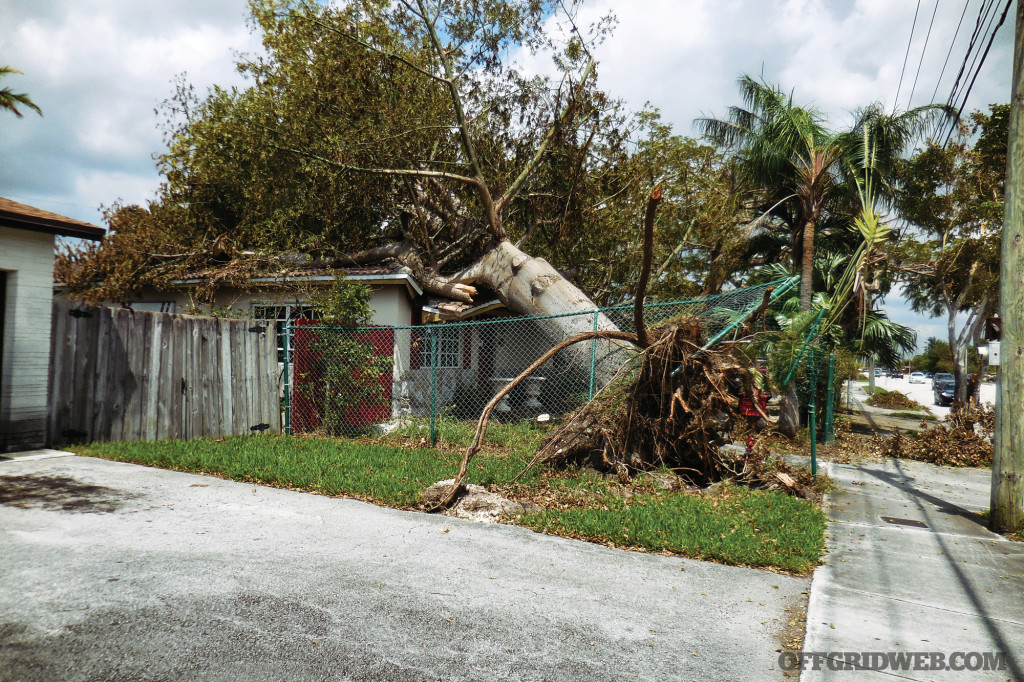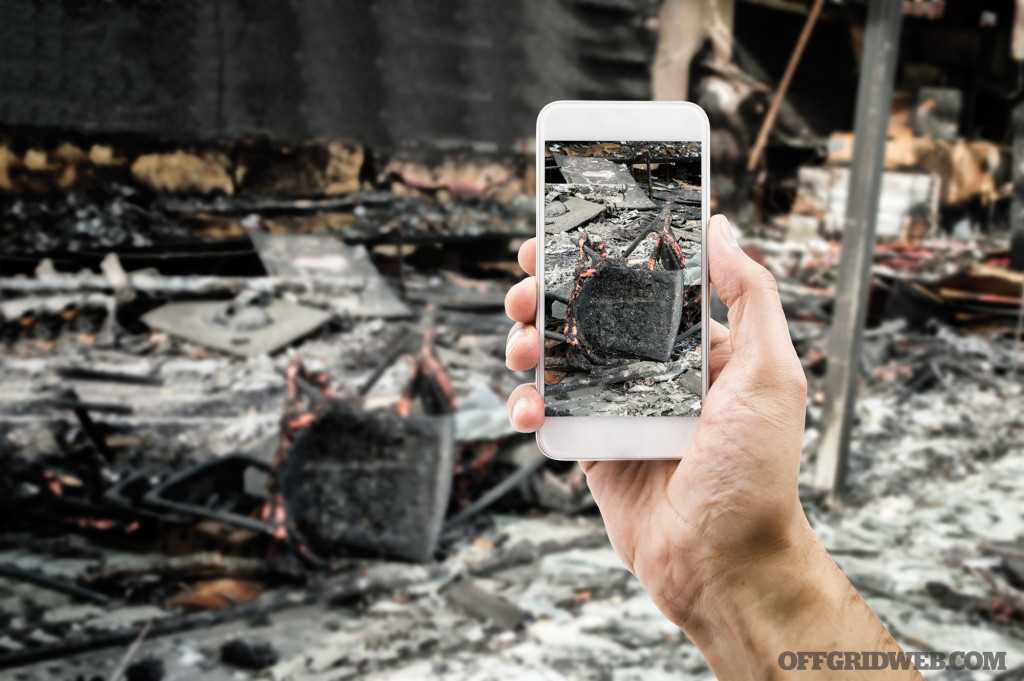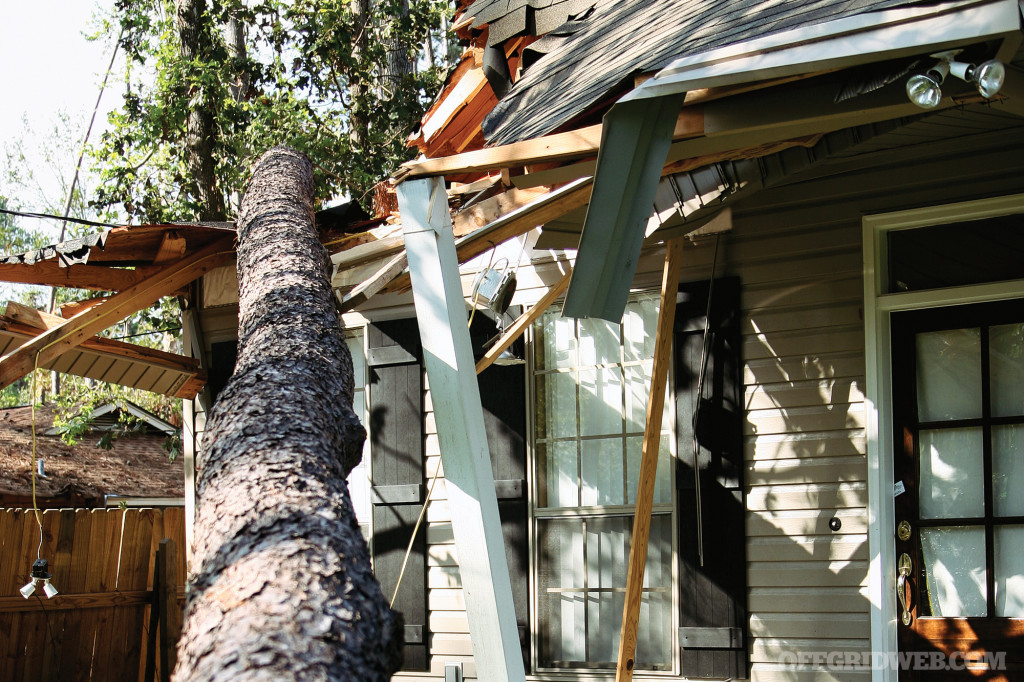RECOIL OFFGRID Preparation Disaster Insurance: Hedging Your Bets for SHTF
In This Article
Disclaimer: No attorney-client relationship is created by the use of the information in this publication. The general information described and materials provided are for illustration and/or informational purposes only, and do not, nor are they intended, to provide legal and/or financial advice. The reader should consult with an appropriate professional in their particular jurisdiction regarding their individual situation. Any use of the general information contained in this article shall be solely at the reader’s risk.
In 2017, three major hurricanes affected the U.S. — Harvey, in Texas; Irma, in Florida; and Maria in Puerto Rico. Recently, we’ve seen the devastation of Hurricane Michael, and it’s only a matter of time before certain areas are battered by another such disaster. In the aftermath of these storms, many of the victims discovered that they were either underinsured or simply didn't have the proper insurance coverage — and would soon be facing enormous out-of-pocket reconstruction costs. This was a very loud wake-up call.
We see it all the time. Every year, many people are driven to financial ruin because they incorrectly assumed that the insurance they had would adequately cover the damages caused by a natural or man-made disaster. To their shock and horror, people often don’t find out that they're underinsured, or completely uninsured, until it’s too late. Although many have insurance, the coverage limits are sometimes insufficient, or they simply lack the appropriate type of coverage. Some people also forget that not all disasters are natural; man-made ones can be just as devastating, sometimes even more so.

In this article, we take a summary look at some of the types of insurance available to protect you and your family, and we also explore some of the many pitfalls awaiting the unwary.
For many, their home is probably their most valuable investment. Having homeowner's insurance is one way that people protect their investment against common perils and hazards. It provides coverage for your home, compensating you in the event of a loss. In other words, if your home is damaged, destroyed, or otherwise affected by an event that’s covered by your policy, homeowner's insurance will help you repair or rebuild your home. It may also help replace personal property that’s lost or damaged. The amount of compensation you receive for any given claim depends on the limits set for your policy, the type of damage, and how it was caused.
A typical homeowner’s policy will often include the following areas of coverage:
But as it turns out, homeowner's insurance is usually something people don’t think about until they come face-to-face with a major loss. Having the appropriate insurance coverage can often mean the difference between being able to recover from a disaster and suffering a catastrophic loss from which you may never recover. Yet, every year far too many homeowners find themselves without the proper coverage when faced with a catastrophic loss.
The type of coverage, and how much you buy, will largely dictate the cost of the insurance. Other factors can also affect the cost of your premium, including where you live, how many claims you have filed in the past, and sometimes even your credit score.
Note: All insurance coverage isn’t the same. Make sure to confirm what you’re buying, and how much it’ll cost. Depending on the coverage and total overall limits, the cost of insurance can vary widely. Also, make sure that you understand the effective date of your policy. A typical homeowner’s insurance policy can have a 30- to 90-day waiting period. Insurance companies do this to reduce fraudulent claims and to prevent homeowners from waiting for a severe weather event before they purchase coverage. As with just about everything else, make sure to read the fine print.
There are many different types of catastrophe insurance for businesses and individuals, but, in general, it covers those high-dollar events that are normally excluded from standard hazard insurance policies. (For example, most homeowner’s policies exclude earthquakes and floods.)

High winds can often take down some very large trees, which in turn can cause extensive property damage.
Catastrophe insurance is meant to protect against unusually severe natural disasters — earthquakes, floods, severe storms — as well as man-made events such as terrorism and civil disorder. This is why it’s important to read your policy, confirm what's covered, and more importantly, what isn’t. Once you’ve identified the gaps you can begin the process of getting additional layers of supplemental coverage, such as catastrophe insurance.
If all this sounds somewhat complicated, it can be. There’s no substitute, however, for doing the appropriate research and identifying both the potential risks and how you plan to protect yourself against those risks. The coverage you eventually purchase will, in many situations, be largely driven by the area in which you live, the value of your property, and your financial ability to recover from a significant loss.
Flooding is one of the most common disasters affecting the U.S. Floods have many causes, including storms, snowmelt, overflowing rivers and streams, and broken dams or levees. All floods have one thing in common — they can be financially devastating, and most homeowner's and renter’s insurance policies don't cover flood damage. Whether you’re in a flood zone or not, if you don’t have flood insurance, you may be one disaster away from financial ruin.
The federal government runs the National Flood Insurance Program (NFIP) issuing flood insurance policies through thousands of insurance agents nationwide. The NFIP is part of the Federal Emergency Management Agency, better known as FEMA. Flood insurance typically covers damage to your home and personal property from floods and other flood-related losses due to rising waters. Buying flood insurance is easy and relatively inexpensive. Coverage is currently capped at $250,000 per house and $100,000 for contents, but additional coverage can be purchased from private insurers.
Whether you’re in a flood zone or not, flood insurance shouldn’t be overlooked. As with other types of coverage, there are steps you can take to reduce the cost of flood insurance. Visit www.floodsmart.gov for more information.

Liability umbrella policies are an additional way to bolster your coverage level and are typically available in...
Disasters come in all shapes and sizes. Imagine that you have a car accident and get sued, or that someone is severely injured on your property and they make a claim against you. In the event of a substantial claim, would your current policy limits be sufficient to protect you and your family from financial ruin?
Umbrella insurance provides additional liability coverage above and beyond the coverage limits of your homeowner's, auto, and other such policies. The main purpose of an umbrella policy is to protect you from a large and potentially devastating liability claim or judgment. Umbrella policies are usually available in million-dollar increments. While not required, an umbrella policy offers increased protection and peace of mind.
While the cost of an umbrella policy represents an additional insurance expense, it may be money well spent if you ever find yourself on the wrong end of a bodily/personal injury or property damage claim. As with all forms of insurance coverage, it’s up to you to weigh the costs versus the benefits.
Note: Umbrella policies generally won't cover losses related to your business or damages to your own property/personal belongings, and they won't protect you from the consequences of your own intentional or illegal behavior.
Just because you don’t own a home doesn’t mean you should be uninsured. Renter’s insurance provides coverage for damage, theft, or loss of personal property. It can also provide liability coverage for injuries to others that might occur on the rented premises. Although renter's insurance is less common than homeowner's insurance, and it’s usually not required, it can often be the only thing standing between a tenant and financial ruin.
Many people are surprised to learn that damages to personal property, and claims against them for injuries from others, will not be covered by the landlord’s policy. As with other types of coverage, the cost of renter's insurance will vary according to the amount of coverage, the deductibles, and how comprehensive the policy is. The more coverage you sign up for, the higher the cost.
In many areas of the country, the cost of homeowner’s insurance has skyrocketed in recent years. This is especially true in regions that have been hammered by hurricanes and other large-scale natural disasters. In some areas of the southeast, for example, many insurers have (1) significantly raised their rates and the corresponding deductibles; (2) stopped writing new policies; or (3) left the state altogether. For many homeowners, this is a major problem since not having coverage is usually not an option.
There are a number of ways to get a break on the cost of your coverage. The best way is to discuss all potential discounts with your agent or insurance company representative before signing up for the coverage. It also pays to shop around since rates and discounts can vary widely among insurers. In general, however, racking up significant discounts isn’t as difficult as many people think. Here are some of the different ways you can save big on your coverage.
Wind Mitigation Inspection: A wind mitigation inspection evaluates a structure’s ability to withstand high winds. The inspector (usually a board-certified contractor, architect, or engineer) will look at the roof, wall construction, opening protection, and other key categories to evaluate the wind-mitigating characteristics of your home, and they’ll also make recommendations for improvement. Although not required, a wind mitigation inspection can save you money and also alert you to any areas needing improvement.
Harden Your Home: Take steps to make your home more resistant to storms and other natural disasters. Consider installing storm shutters, reinforcing your roof, and modernizing the home's mechanical systems. Not only will you save money, but you’ll likely be safer and more secure. Ask your insurance agent/representative for other steps you can take to lower your premiums.

When shopping for insurance, request representatives with at least 10 years of experience and make sure you’re...
Shop Around: Insurance costs can vary widely, even within the same area and for essentially the same coverage. It may take some time, but you can save big. The National Association of Insurance Commissioners (www.naic.org) provides information for insurers in your state. You can also check with friends, relatives, and neighbors; don’t forget to contact your local insurance agent too as they can help look for the best coverage at the most affordable price. Lastly, price is definitely important, but so is quality. Make sure to check on the financial stability of the companies you're considering.
Discounts: Ask what discounts are available. Some companies will offer you substantial savings if you have multiple policies with them. You can also get discounts for improving home security. Installing fire and burglar alarms, smoke detectors, sprinkler systems, and dead-bolt locks, for example, may get you a hefty discount.
Good Credit Score: Maintaining a good credit history may actually help you save on insurance costs. More and more insurers are looking at your credit when they price your policy. This is yet one more reason to periodically review your credit report. You can get a free copy of your credit report at www.annualcreditreport.com for all three reporting agencies (Equifax, Experian, and TransUnion) once every 12 months.
The “disaster” (fill in the catastrophe of choice) caused a lot of damage, but thankfully you and your family are safe. Now starts the recovery and reconstruction stage. You’ll want to take immediate steps to not only mitigate your losses, but also to document your damages as completely as possible. Here are some tips, ideas, and suggestions to help get you started.
Contact Your Insurance Company and File a Claim: This may seem obvious, but surprisingly many people wait far too long to start this process. Before you call your insurer, make sure to have all the necessary information on hand. If possible, write it all down ahead of time. Before hanging up with your insurer, make sure to get a claim number and the name and phone number of the person you spoke with. Also get the contact information for the adjuster who will be handling your claim. Provide the insurance company with your updated contact information, including a temporary address, email, and phone number where they can reach you.
Document the Damage: To the extent possible, you should take photographs and video of all the damage. Start at one end of you property and carefully document everything. Take as many photographs as possible, including shots from multiple angles, with wider shots showing the damage to the front, sides, and backyard. Do the very best that you can to describe the damage accurately and completely. Take copious notes. If possible, take a video recording of the entire property.

Photographically documenting any damage your property may have incurred will better your odds of getting a settlement...
Mitigate the Damage: Many insurance policies require you to take steps to mitigate or prevent further damage to your property. This means that you may be responsible if you failed to take reasonable steps to safeguard and protect your property from further loss/damage. What this actually means will vary widely depending on the circumstances. Just make sure to completely document all the damages before you start making even temporary repairs or cleaning up.
Mark Your House: Take a moment to spray paint your house number, street name, and the insurance company name on the front of your property. Remember street signs and house numbers may be damaged or missing altogether after a major event. Marking your house will make it easier for the insurance company representatives and adjusters to find your house.
Inventory Personal Property: Aside from taking photographs and video, it’s also a good idea to make a list of all personal property that was lost or damaged. If you have receipts that's even better. If not, do the best you can to verify the value.
Start a Journal/File: This is one of those things that just makes sense. Immediately start a notebook and file to document your claim and all communication with the insurance company. After each contact make an entry with the date, time, and name and contact information of the person you spoke with. Also try to summarize the content of the conversation as best you can. Don’t try to rely on your recollection of details or events — write it down and be as descriptive as possible.
Save all Receipts: Make sure to keep copies of all receipts for temporary housing and other living expenses. Insurance policy coverage and limits vary, but keep all receipts and submit them to the insurance company for reimbursement.
Independent Public Adjuster: After a major disaster, insurance companies may receive tens of thousands of claims in a very short period of time. Addressing all these claims will require an army of insurance adjusters. Many of these adjusters will have a tremendous workload, under tight time constrains to get the claims processed. Hiring an independent, public adjuster may help speed up the process and ensure you receive a fair amount for your claim.
File a Flood Insurance Claim: Many homeowners have several different kinds of coverage, including an additional policy for flood insurance. Don’t assume you don’t have coverage, and don’t assume which policy will pay for any specific damages. Promptly file your claims with all the insurers.

Take steps to mitigate any damage with inspections ahead of time to reduce your costs and prove you’ve done your due...
File an Automobile Insurance Claim: Once again, document all the damage with photographs and video, file your claim, mitigate your damages, and keep a log of all contact with the insurance company, including claim numbers and the name and contact information for all personnel you speak with.
File a Claim for Lost or Damaged Firearms: Guns are sometimes covered under standard homeowner’s policies, but there are usually serious limitations. As such, many gun owners obtain additional coverage under separate policies. Make sure to promptly file a claim under any additional policies, and record all the particulars of the claim.
Other Options: If you find that you’re either uninsured or underinsured for your losses, you may still have other options. You should immediately contact the Federal Emergency Management Agency (FEMA at www.disasterassistance.gov) to inquire if you qualify for grants or low-interest loans for recovery and reconstruction, emergency housing, repairs, or other storm-related expenses.
Legal Advice: Whether it’s a denied claim, or you’re just not satisfied with the amount the insurance company is offering, you should consult an attorney specializing in insurance law before making any major decisions or signing any documents. Make sure to keep copies of all correspondence with your insurance company and any documentation you may have regarding your losses. A professional can evaluate your claim, review your policy, and ensure that you get a fair payment for your claim.
Whether it’s a natural or man-made disaster, house fire, burglary, or some other unfortunate event, you need to take reasonable precautions to protect yourself, your family, and your property. You don’t have to live along a major geological fault line or in an area frequently hit by flooding, tornadoes, or severe storms to have a plan and make preparations.
Disasters usually appear with little or no warning. And while living with risk is an inescapable part of life, you should always try to minimize and mitigate that risk. Insurance, however, steps in when all else fails. The best time to analyze your insurance needs and to secure the proper coverage is before you need it. Once the disaster is at your front door, it’s too late to do anything other than take cover and hope for the best.
Understanding what coverage you have, and more importantly what coverage you may need, is one of the best ways to get started. Now is the time to calmly sit down and review your situation, examine your options, and make prudent decisions. Hopefully, you'll never need to use your insurance coverage, but as with all your other preparations, having them significantly improves your situation no matter what calamity comes your way.
Regardless of where you may live, or what risks you may face, having the appropriate insurance coverage can take your preparations to a higher level and protect you against severe economic loss. Stay safe and be prepared.
Richard Duarte is a practicing attorney, urban survival consultant, writer, and firearms enthusiast. He’s the author of Surviving Doomsday: A Guide for Surviving an Urban Disaster, and The Quick Start Guide for Urban Preparedness. www.quickstartsurvival.com
Don’t miss essential survival insights—sign up for Recoil Offgrid's free newsletter today!
Read articles from the next issue of Recoil Offgrid: Issue 30
Read articles from the previous issue of Recoil Offgrid: Issue 28
Check out our other publications on the web: Recoil | Gun Digest | Blade | RecoilTV | RECOILtv (YouTube)
Editor's Note: This article has been modified from its original version for the web.
 STAY SAFE: Download a Free copy of the OFFGRID Outbreak Issue
STAY SAFE: Download a Free copy of the OFFGRID Outbreak Issue
No Comments